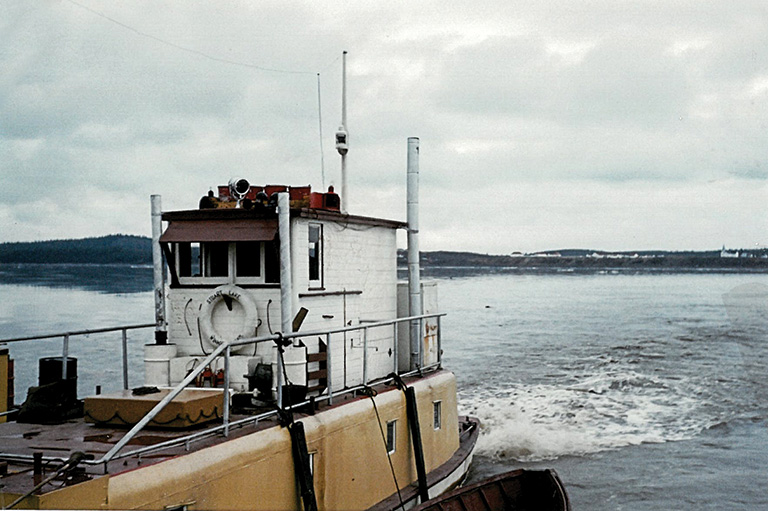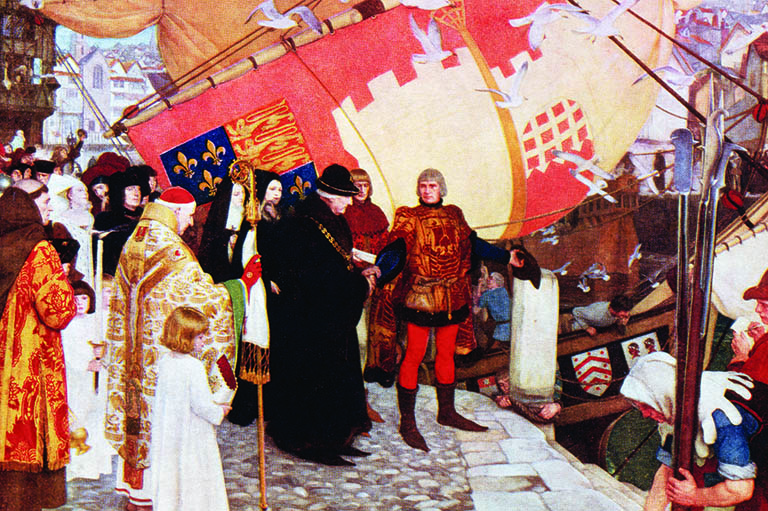A Voyage in Time

In 1957, Thomas Marsh was working at Fort Nelson, B.C., with the Hudson’s Bay Company’s Transport Division, which operated the Stuart Lake — a small tugboat that plied the rivers and lakes between Fort Nelson and Great Slave Lake in the Northwest Territories. Today a retired lawyer living in West Vancouver, Marsh was eighteen years old in 1957.
The Stuart Lake’s route was a small part of a wider transportation system that carried freight by rail and by rivers into the North. A gas-powered tugboat, the Stuart Lake was about fourteen metres long and around three metres wide. The locals nicknamed it the “banana boat” because it often carried fruits and vegetables. Its primary job was to push three old wooden freight barges, assisted by a smaller, locally built wooden tugboat.

When Marsh arrived at Fort Nelson in 1957, he found the local shipyard to be a hive of activity as the tugs and barges were loaded and readied for launch. Marsh fondly recalls two long-term Hudson’s Bay Company Transport employees, Andy Johnson and Happy (H.T.) Hamilton, who were both crucial to the operation’s success. When Marsh was later attending university, Hamilton helped him get a summer job with Northern Transportation, a rival to HBC Transport in the North.
Marsh’s work kept him mostly on dry land, but he enjoyed travelling with the crew when the occasion allowed. However, the Stuart Lake wasn’t built for comfort. During one particular trip to Fort Liard, N.W.T., he spent a rather restless night moving about the cramped tugboat in search of an unclaimed sleeping berth. However, the striking scenery of the North more than made up for any discomfort. From the mountains and forests along the Liard River, to the impressive ramparts of the Mackenzie River, the landscapes left an indelible impression on the young man.

Looking back, Marsh recalls many memorable moments, like the time he was asked to carry a “large bag of coins” to a Hudson’s Bay Company post downriver. Marsh kept the bag hidden under his bunk. At one point that summer, Marsh and a colleague, Jeff Partington, were told to travel aboard the Stuart Lake to Aklavik, N.W.T., and then catch a flight to Tuktoyaktuk, N.W.T., on the Arctic coast, where they were to join the HBC supply ship Fort Hearne.

Arriving at Aklavik, Marsh and Partington stayed the night in a storeroom. The local eatery’s menu consisted largely of ham and eggs, and the most popular tourist attraction was the final resting place of Albert Johnson, the Mad Trapper. The flight to Tuktoyaktuk turned out to be a two-stage affair. First, the men were to fly north on a small plane and then spend the night at a relay station on the DEW Line — a string of Cold War-era radar installations. The next day, they were to catch a second flight to the coast.
With room for only one passenger, Marsh went first, and Partington followed later. Upon his arrival at the DEW Line station, Marsh was invited into a large, well-heated tent where canned goods and other supplies were stored.
He asked for a tour of the relay station but was told that it was off limits. Fortunately, he was carrying a bottle of scotch. After offering his host a swig, Marsh got his tour. Later, Partington arrived, and the two men enjoyed a meal of steaks and beans with the station’s staff.
Marsh soon headed off for university, but he returned to the North to work during the summers. He graduated with a law degree in 1963 and enjoyed a career with the federal Department of Justice. He was made a Queen’s Counsel in 1986 and retired in 1995. Except for visits to Whitehorse, Yukon, and Yellowknife, N.W.T, in connection with his Justice Department work, Marsh never returned to the North.

We hope you’ll help us continue to share fascinating stories about Canada’s past by making a donation to Canada’s History Society today.
We highlight our nation’s diverse past by telling stories that illuminate the people, places, and events that unite us as Canadians, and by making those stories accessible to everyone through our free online content.
We are a registered charity that depends on contributions from readers like you to share inspiring and informative stories with students and citizens of all ages — award-winning stories written by Canada’s top historians, authors, journalists, and history enthusiasts.
Any amount helps, or better yet, start a monthly donation today. Your support makes all the difference. Thank you!
Themes associated with this article
Advertisement
With 7 uniquely curated newsletters to choose from, we have something for everyone.




